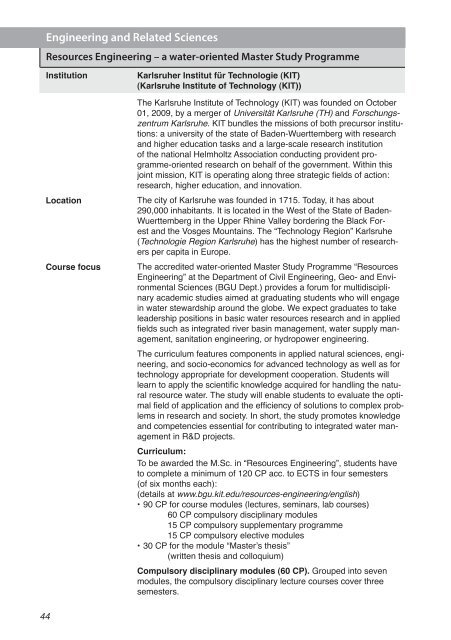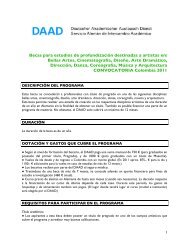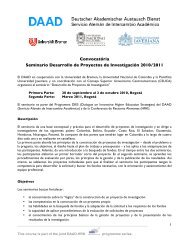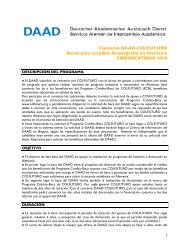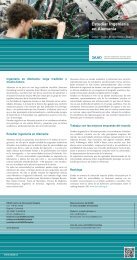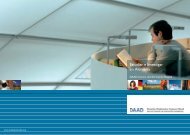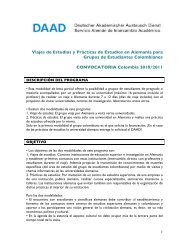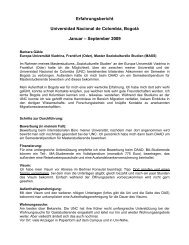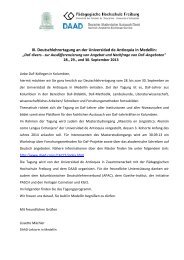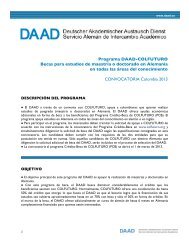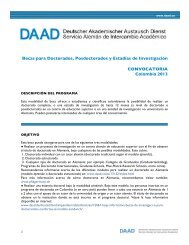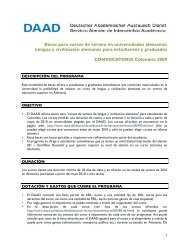Becas de Posgrado dirigidas a Profesionales de PaÃses en ... - Daad
Becas de Posgrado dirigidas a Profesionales de PaÃses en ... - Daad
Becas de Posgrado dirigidas a Profesionales de PaÃses en ... - Daad
Create successful ePaper yourself
Turn your PDF publications into a flip-book with our unique Google optimized e-Paper software.
Engineering and Related Sci<strong>en</strong>cesResources Engineering – a water-ori<strong>en</strong>ted Master Study ProgrammeInstitutionLocationCourse focusKarlsruher Institut für Technologie (KIT)(Karlsruhe Institute of Technology (KIT))The Karlsruhe Institute of Technology (KIT) was foun<strong>de</strong>d on October01, 2009, by a merger of Universität Karlsruhe (TH) and Forschungsz<strong>en</strong>trumKarlsruhe. KIT bundles the missions of both precursor institutions:a university of the state of Ba<strong>de</strong>n-Wuerttemberg with researchand higher education tasks and a large-scale research institutionof the national Helmholtz Association conducting provi<strong>de</strong>nt programme-ori<strong>en</strong>tedresearch on behalf of the governm<strong>en</strong>t. Within thisresearch, higher education, and innovation.The city of Karlsruhe was foun<strong>de</strong>d in 1715. Today, it has about290,000 inhabitants. It is located in the West of the State of Ba<strong>de</strong>n-Wuerttemberg in the Upper Rhine Valley bor<strong>de</strong>ring the Black Forestand the Vosges Mountains. The “Technology Region” Karlsruhe(Technologie Region Karlsruhe) has the highest number of researchersper capita in Europe.The accredited water-ori<strong>en</strong>ted Master Study Programme “ResourcesEngineering” at the Departm<strong>en</strong>t of Civil Engineering, Geo- and Environm<strong>en</strong>talSci<strong>en</strong>ces (BGU Dept.) provi<strong>de</strong>s a forum for multidisciplinaryaca<strong>de</strong>mic studies aimed at graduating stu<strong>de</strong>nts who will <strong>en</strong>gagein water stewardship around the globe. We expect graduates to takelea<strong>de</strong>rship positions in basic water resources research and in appliedagem<strong>en</strong>t,sanitation <strong>en</strong>gineering, or hydropower <strong>en</strong>gineering.The curriculum features compon<strong>en</strong>ts in applied natural sci<strong>en</strong>ces, <strong>en</strong>gineering,and socio-economics for advanced technology as well as fortechnology appropriate for <strong>de</strong>velopm<strong>en</strong>t cooperation. Stu<strong>de</strong>nts willralresource water. The study will <strong>en</strong>able stu<strong>de</strong>nts to evaluate the opti-lemsin research and society. In short, the study promotes knowledgeand compet<strong>en</strong>cies ess<strong>en</strong>tial for contributing to integrated water managem<strong>en</strong>tin R&D projects.Curriculum:To be awar<strong>de</strong>d the M.Sc. in “Resources Engineering”, stu<strong>de</strong>nts haveto complete a minimum of 120 CP acc. to ECTS in four semesters(of six months each):(<strong>de</strong>tails at www.bgu.kit.edu/resources-<strong>en</strong>gineering/<strong>en</strong>glish)• 90 CP for course modules (lectures, seminars, lab courses)60 CP compulsory disciplinary modules15 CP compulsory supplem<strong>en</strong>tary programme15 CP compulsory elective modules• 30 CP for the module “Master’s thesis”(writt<strong>en</strong> thesis and colloquium)Compulsory disciplinary modules (60 CP). Grouped into sev<strong>en</strong>modules, the compulsory disciplinary lecture courses cover threesemesters.44


